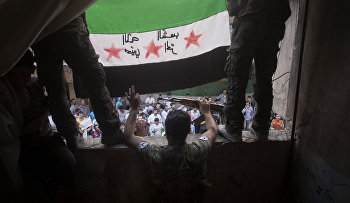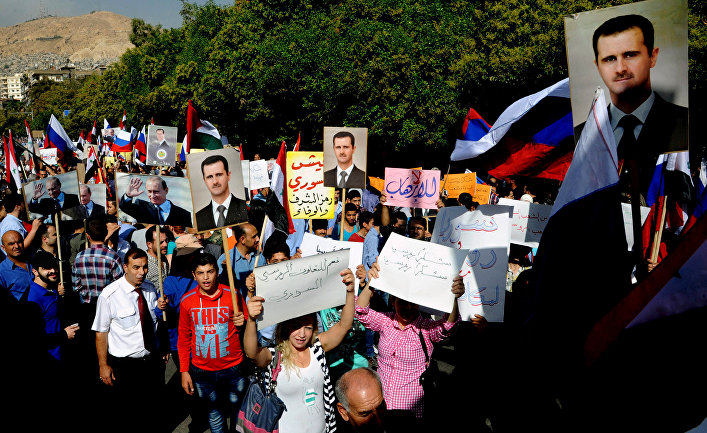Last week US Secretary of State John Kerry made the following announcement. “We want to replace Assad, not his regime.” Having learned their lessons from their fiasco in Iraq, the USA and its western allies hope to preserve the infrastructure of the Syrian state – to avoid engendering an Islamic chaos by overthrowing the Damascus regime. However, after four years of warfare, neither the Russian nor Iranian allies, nor yet still the opposition groups can name a successor within the regime who would be able to grant guarantees to minority groups and keep the peace.
Why is it so hard to find a replacement for Assad within the regime?
The reason is that everything revolves around the President himself. “His father, Hafez Assad, set the system up in such a way that everyone is subordinate to the leader, who holds the central position” says the former Syrian Ambassador in London, Sami Hiyyami. “But the second problem is the Alawite minority. The Alawite generals would have to trust whoever replaces Assad.” By 2015 Bashar al-Assad is no longer the neophyte president who once had to share power with his family circle. Today he is the only military leader able to face off an opposition of thousands. The conflict has boosted his control at every level of power – even in apparently insignificant matters. If Hezbollah tries to seize the home of a businessman in Damascus, the owner can go straight to the president to resolve the dispute. An opposition leader in Beirut has to ask the president's permission to attend a conference in Norway.

“During the Hafez era there were other prominent figures – Ali Duba in intelligence, Farouq ash-Shara and Abdelhalim Khaddam in politics,” a businessman from Latakia relates. “Today, none of us could even give any other names. Bashar has created a vacuum around himself.” This means that the possibility of a palace coup is remote. “We've tried to find a successor to Assad, but we've failed,” as Ali Akbar Velayati, diplomatic advisor to the Iranian leadership said recently. “It's what the Russians are currently trying to explain to the Americans,” another UN diplomat adds. “Bashar comes with guarantees for the army, and for the state. Can you suggest anyone else who can offer that?” Assad holds all the cards – most particularly the important ones, of the army and the special services. “It would take a lot of time to take those away from him,” one Arab diplomat in Damascus averred. Yet this is the exact aim of the transition process which has been taking shape since the first Vienna meetings of mid-November this year.
Who are the key figures in the transition process?
A number of names recur in discussions about leaders in the transition process. The most prominent is the former Vice-President, the Sunni Farouq ash-Shara – who has been held under house arrest in Damascus since the start of the revolution. He would make a compromise figure. “Shara would suit both his own Baas party and opposition groups alike”says opposition figure Haytham Manna, who remains in contact with Shara. Shara's critical approach to the way Assad dealt with the revolution has earned him the sympathy of many opposition activists. Hafez Assad's former foreign minister doesn't rub Saudi Arabia up the wrong way, and is well-known to both Europeans and Americans. Although Iranians aren't fond of him, they would still prefer working with a known leader than one who is entirely unknown. However, two issues dog his candidacy. Assad may well object to a transitional government if it is led by Shara, as one expert on Syrian affairs has said. “Assad fears that the transition process would be a success under Shara” — and this would force Assad out of power. His advanced age (of 77), and poor health present the second issue.
Ali Mamluk, currently the head of National Security – a figure who enjoys Russian support – might also play a decisive role, perhaps not as prime-minister, but as a foreign minister with extended powers. He is a Sunni who maintains his links with the foreign intelligence services with whom he battled the Islamists until 2011. Mamluk is greatly favored by Egypt, the UAE and Oman – and this summer he held meetings in Riyadh with the son of Saudi monarch Mohammed ibn Salman. He is a trusted ally of Assad's, and was sent this summer to Moscow, Tehran, and Cairo to set up the Russian operations. Although Mamluk remains one of the architects of Syrian repression “he meets the Russian and American expectations of continuity in the army and special services in a future Syria,” agrees Haytham Manna.
Western powers may be flexible on Syria's Assad in a future role. Should he stay in power during proposed elections?
— The BRICS Post (TBP) (@TheBricsPost) December 7, 2015
The wild card in the pack would be the former general of the Republican Guard, Manaf Tlass – who fled to Paris in the summer of 2012, with the connivance of French Intelligence. He firmly opposes religion. “This would be critical in the formation of a new army that has to remain both national and secular,” Haytham Manna affirms. Manaf Tlass is a Sunni, and the son of Hafez Assad's former Defence Minister. He has made himself well known to representatives of Western powers in Damascus.
Suhail al-Hassan is an Alawite Colonel they nickname 'the Tiger' – one of the most well-known officers in the war against the rebels. He has huge support among the Alawite minority, and could easily become the new C-i-C of the Syrian army. As far as cabinet seats in any new government are concerned, we should keep in mind the Moscow-compiled list of 38 opposition activists – which includes three previous presidents of the National Coalition (Ahmed Jabra, Moaz al-Khatib, and Hadi al-Bahr) and its current leader Khalid al-Khoja. That list similarly includes historic opposition figures such as Mishel Kilo, along with two Muslim Brotherhood representatives in the shape of Mohammed Taifure and Mohammed Khabash. Saudi Arabia similarly compiled a list of twenty names, while Egypt has made one of ten candidates. In addition there are commanders such as Zahran Alloush who might be acceptable, or perhaps not very much so. Overall, the casting process is going to be far from simple.
How many individuals would have to go, to cut ties with the Assad regime?
Between 40 and 50 in some sectors, and up to 200 in others. Here discussion refers to the leadership in the special services, the army, and organizations which played leading roles in the repression. Around twenty of these have already gone (including presidential in-law Asef Shawkat, Rostom, Ghazaleh, and Jameh Jameh) while Bashar al-Assad's cousin, Hafez Mahluf, fled to refuge in Belarus. Dismantling the system of control in the army intelligence services must be a priority. “When I was commanding a detachment I had three Alawite Colonels around me” said one general who deserted. “In theory they were supposed to be my subordinates, but that didn't chime with the decisions I was able to make. For example, an attempt to escape – in which case, they had orders to kill me.”
ECFR brief on Syria: "Assad question is now far from being the answer to the ISIS question" https://t.co/JHpKdqwqE8 pic.twitter.com/Etja7IxOZW
— Russian Embassy, UK (@RussianEmbassy) December 7, 2015
Russia hopes to preserve the backbone of the army, which has been formed over decades. “In the army we have more than two dozen generals, each of which would be capable of playing such a role,” one opposition leader claims. “But they are unable to make a move whilst the war drags on, and the political process is not up-and-running. They cannot show their hand openly, because they must first reassure the Alawite and Christian minorities who fear retaliation from the rebels.” To remove the most trusted of Assad's people whilst keeping the structure of the defense system in place, and without giving way to a wave of revenge from former victims is going to be a very difficult task. Even more so, given the need to keep a leadership in place who will manage the struggle with the Islamists and local warlords – who have no intention of laying down their weapons. “This is why we need strong governmental structure prior to the elections, and not after” says Haytham Manna. “If that doesn't happen, then things will be decided by emotions, rather than the quality of people.”
Is there a strategy mismatch between Russia and Iran?
Both the Russians and the Iranians believe that Bashar al-Assad is their best ally against Sunni Islamic terrorism. However, in the medium term their agendas might differ. Iran is more supportive of the individual role of Assad than Russia is. “This is a red line for us” explained Ali Akbar Velayati on Sunday. Tehran has debts of loyalty to Damascus, its sole ally in its war with Iraq between 1980 and 1988. Furthermore, the Lebanese Hezbollah has a strong position in Syria, Iran's allies. This means that Iran will not, under any circumstances close Hezbollah's 'window' in Lebanon – which the Sunni government there wishes to shut. Moscow doesn't care about Hezbollah.
#Putin not #Khameini will be deciding #Assad's fate, writes columnist @abowen17: https://t.co/lhZUPZRdDt #Iran #Syria #Russia
— Al Arabiya English (@AlArabiya_Eng) December 2, 2015
The main thing for Moscow is the army. “You can stop telling me that we're advocates for Assad,” as Russian FM Sergey Lavrov recently rebuked a Syrian opposition leader. Tehran's natural allies are the armed units which Tehran has been forming since 2012. These groupings are closely linked to the personality of Bashar al-Assad himself. Without him, they will collapse. Iran also has little taste for Russia's brand of intervention, which affords Moscow a leading role in the operations. A further issue is that in seeking to undermine the neutrality of the Gulf State Sunni monarchies, Putin has promised to weaken Syria's dependence on Iran. Russia is trying to woo the oil kingdoms of the Gulf to its cause. After all, who is going to be paying for the rebuilding costs in Syria? It's going to be the Gulf States, and not Iran.






